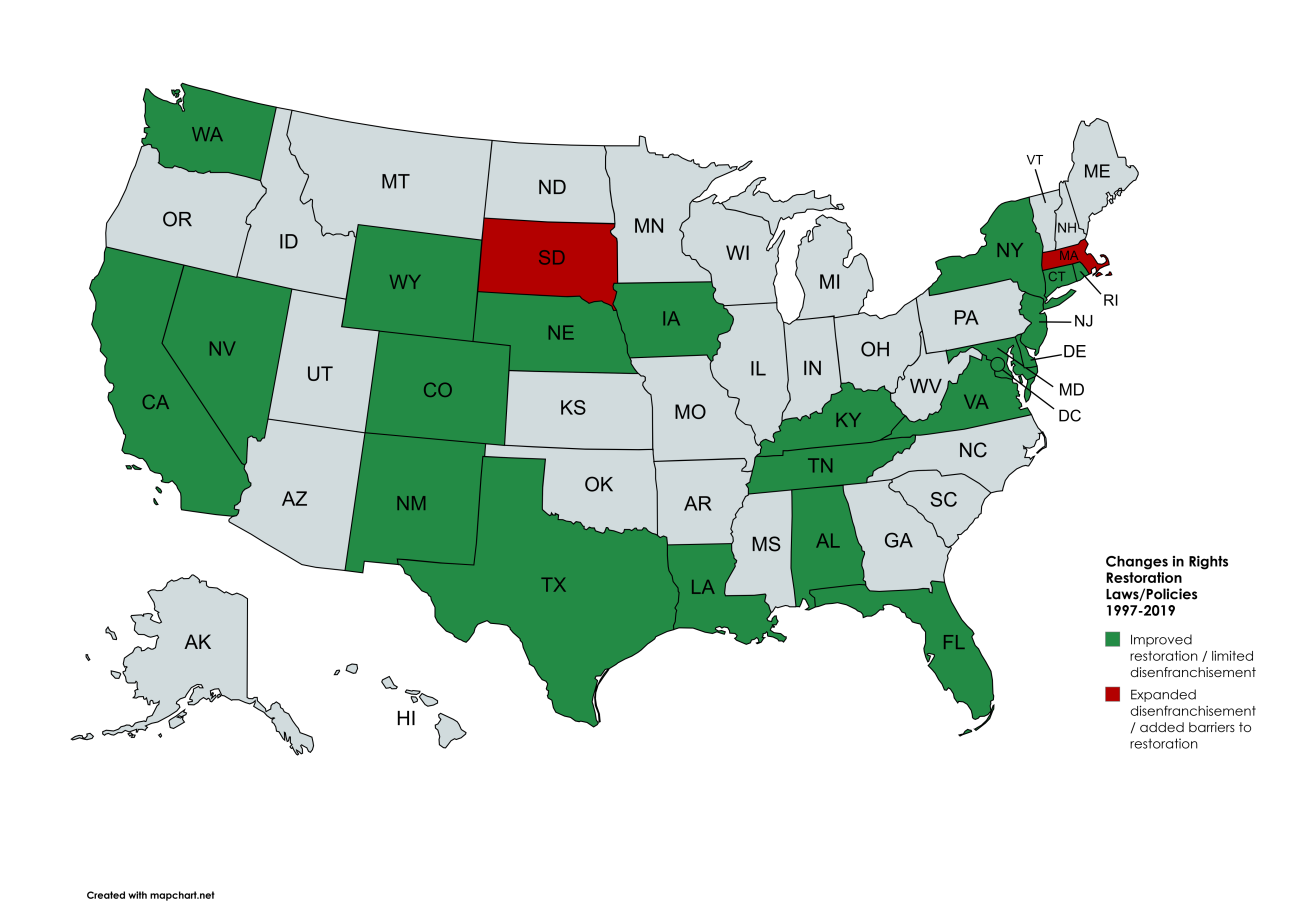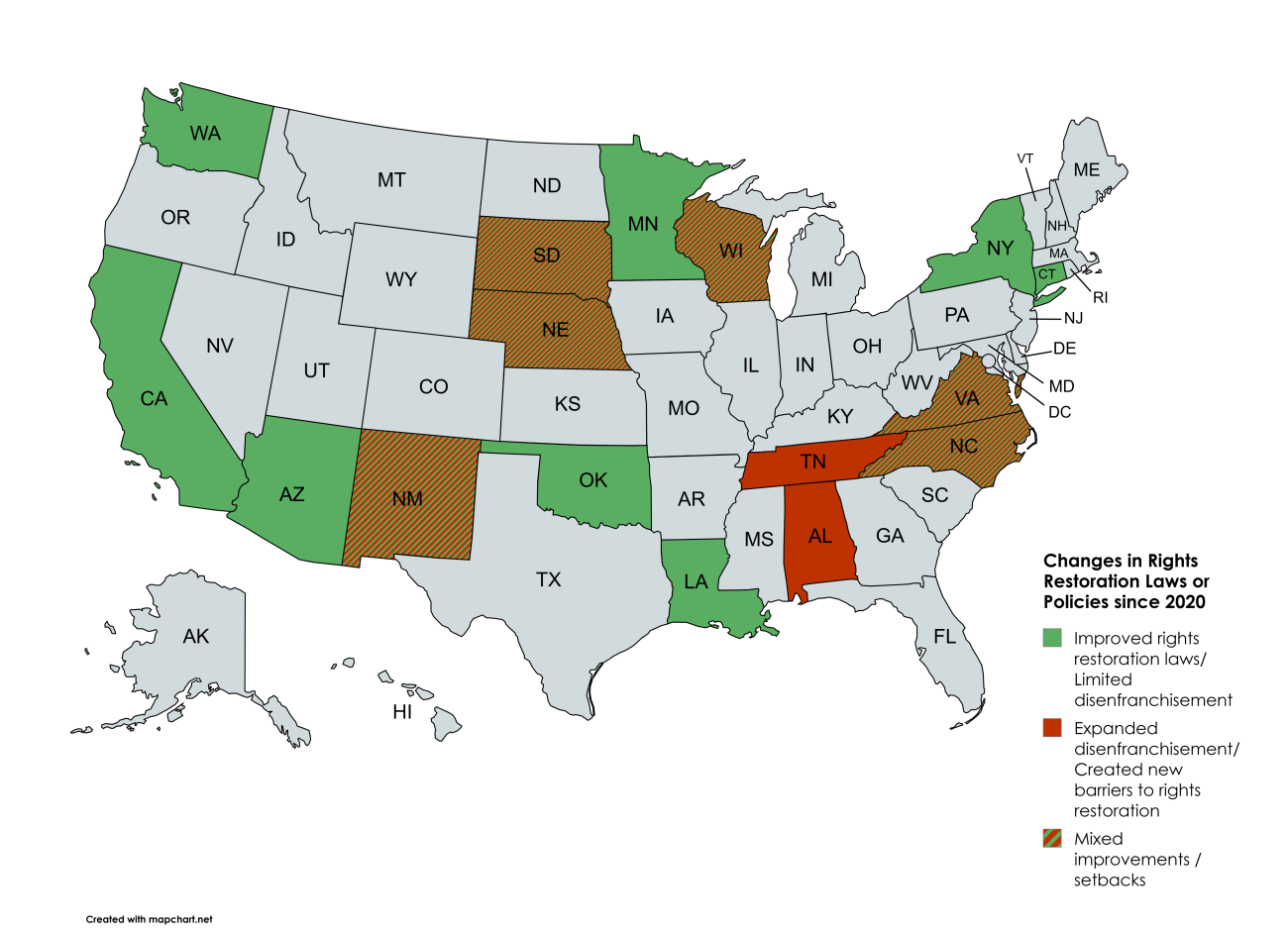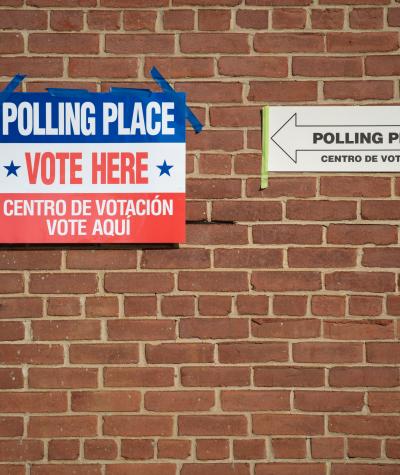All Americans — regardless of whether they have a felony conviction — should be able to exercise their freedom to vote.
Yet, across the country, voting rights restoration is being undermined by new laws and administrative barriers that are attempting to curtail the progress made by rights restoration advocates, including by Campaign Legal Center’s (CLC) Restore Your Vote team and our local partners.
To combat this troubling backsliding, advocates and policymakers alike must work to end felony disenfranchisement schemes nationwide and fight for rights restoration policies that make our democracy more inclusive and accessible.
Felony Disenfranchisement and Rights Restoration
Felony disenfranchisement laws proliferated in the United States after Reconstruction as part of an intentional scheme to strip Black Americans of their newly won freedom to vote. True to their design, these laws continue to have a disproportionately large impact on Black and brown voters to this day.
While we have seen some progress across the country, most states have work to do to eliminate laws that exclude people with felony convictions from voting.
All reforms should aim to enfranchise as many people as possible, do so automatically and avoid monetary requirements for voting rights restoration that discriminate based on wealth.
Learn more about abolishing felony disenfranchisement here.
Successes in Fighting Backsliding
In a disappointing pattern, some states have started rolling back hard-won progress on voting rights restoration. But, Campaign Legal Center and our local partners have been using all the tools at our disposal to fight back, from advocacy to litigation.


One such example is in Wisconsin, where we were successful in getting what would have amounted to a modern-day poll tax defeated. By requiring Wisconsinites with prior felony convictions to pay all outstanding legal fees before their right to vote was restored, Wisconsin’s Assembly Bill 87 — which passed the state legislature — would have created unnecessary barriers for individuals seeking to have their voting rights restored.
Laws requiring individuals to pay off fines, fees and restitution before they can restore their right to vote are modern-day poll taxes. Under these laws, if a rich person and a poor person are convicted of exactly the same crime, the rich person will be able to buy their right to vote back while the poor person will remain disenfranchised indefinitely.
Campaign Legal Center organized state partners to send a letter to Wisconsin Gov. Tony Evers to veto Assembly Bill 87. Evers ultimately did veto the bill, acknowledging that it would have made it more difficult for Wisconsinites to cast their ballots.
Additionally, in 2024 the Alabama Legislature passed a bill that expanded the list of disenfranchising crimes. Set to go into effect in October of 2024 — just a month before a major election — CLC filed a lawsuit challenging this law on behalf Alabamians with past felony convictions. As a result, Alabama voters scored a victory receiving a favorable order from the judge, which declared that the new law would not affect voters before the November 2024 election.
In New Mexico, we are continuing to ensure that the state’s new rights restoration law can take full effect. After New Mexico passed a law to restore voting rights to people with felony convictions in 2023, state officials introduced new barriers shortly thereafter by requiring in-person registration for formerly incarcerated individuals, contradicting the very spirit of the new law.
In response, Campaign Legal Center filed a lawsuit on behalf of Millions for Prisoners New Mexico and several individuals, arguing that the state's new requirement was burdensome and discriminatory. Our legal action led to a settlement with the state, and New Mexicans with past felony convictions were able to exercise their freedom to vote in the 2024 election. We are continuing our fight to make that win permanent.
Learn more about our lawsuit here.
Holding the Line and Moving Forward
Campaign Legal Center will use these victories in Wisconsin and New Mexico to propel us forward as we continue to face challenges in dozens of states across the country, including Alabama, Tennessee, North Carolina, South Dakota and Virginia.
Campaign Legal Center’s Restore Your Vote initiative continues to lead the charge, offering direct support, legal advocacy and organizing tools to dismantle felony disenfranchisement. Support our work today.


